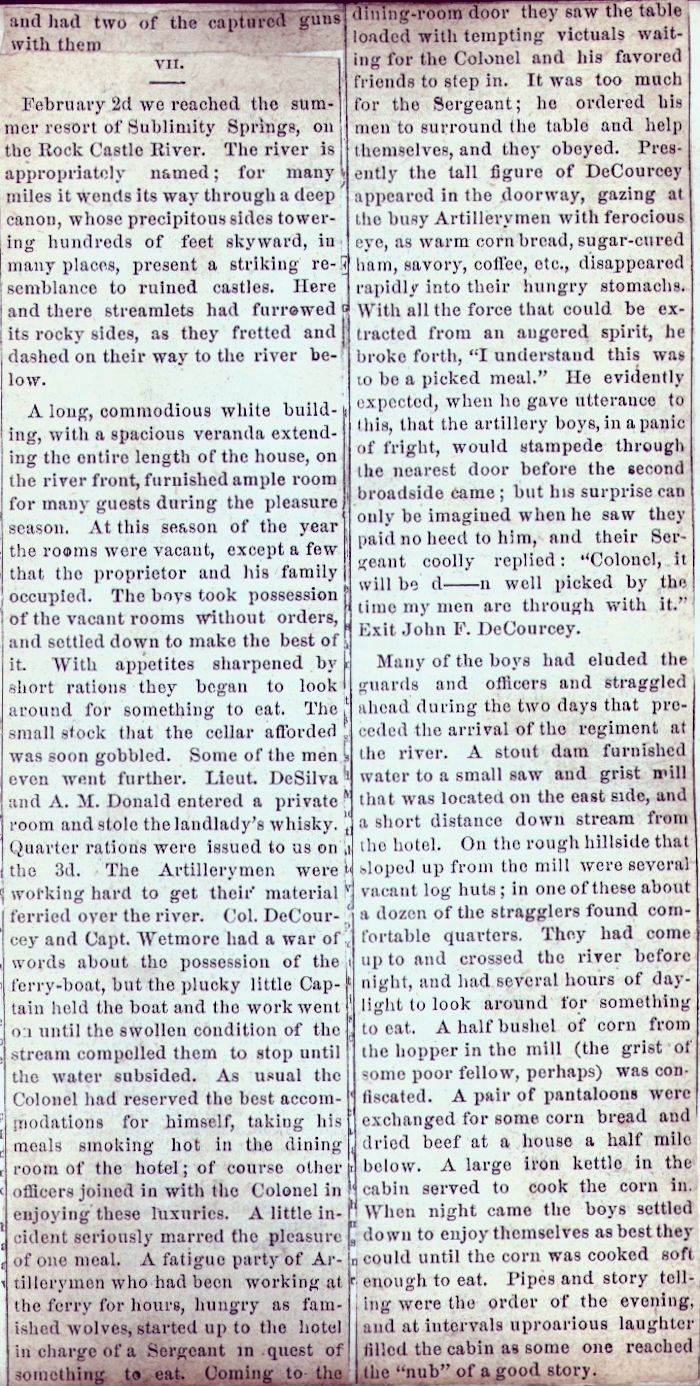| Camp & Field Page 10 | Camp & Field Index Page | 16th OVI Home Page | Camp & Field Page 12 |
The Camp & FieldArticles by Theodore Wolbach |
 Cpl. Theodore D. Wolbach |
The following image is taken from a book titled "Mortality and Statistics of the Census of 1850" in which it is believed retired Captain Rezin H. Vorhes, Company H, pasted over the pages a series of articles written by Cpl. Theodore D. Wolbach, Company E, titled "Camp and Field" and published, by chapter, in the Holmes County (Ohio) Republican newspaper from February 24, 1881 to August 17, 1882. The articles tell the story, in great detail and color, of the 16th OVI, from the inception of the 3-year regiment in October, 1861, through all its camps, battles and marches until it was disbanded on October 31, 1864. The articles pasted in the Vorhes book cover the first 35 chapters, published through October 20, 1881. All the remaining chapters were recently found in a Holmes County library by researcher Rob Garber who obtained copies, performed the transcriptions and provided to this website and which are also presented here, thus providing the complete work by Theodore Wolbach.
Throughout these articles click on the underlined white text for additional details.
The webauthor thanks 16th Ohio descendant Rob Garber for his excellent research on the Camp And Field articles and for performing the tedious digital transcription of those articles found on each page. The transcriptions were made to reflect the original articles verbatim, misspellings and all. Rob is the 3rd great nephew of Capt. William Buchanan, Company F, 16th Ohio, who served in the 90-day regiment as a private, re-enlisting in the three year regiment, and eventually making the rank of Captain of Company F. Thanks Rob!
Page 11 - Chapters 6, 7 - February, 1862
 |
and had two of the captured guns with them. Published in Holmes County Republican VII. February 2d we reached the summer resort of Sublimity Springs, on the Rock Castle River. The river is appropriately named, for many miles it wends its way through a deep canon, whose precipitous sides towering hundreds of feet skyward, in many places, present a striking resemblance to ruined castles. Here and there streamlets had furrowed its rocky sides, as they fretted and dashed on their way to the river below. A long, commodious white building, with a spacious veranda extending the entire length of the house, on the river front, furnished ample room for many guests during the pleasure season. At this season of the year the rooms were vacant, except a few that the proprietor and his family occupied. The boys took possession of the vacant rooms without orders, and settled down to make the best of it. With appetites sharpened by short rations they began to look around for something to eat. The small stock that the cellar afforded was soon gobbled. Some of the men even went further. Lieut. DeSilva and A.M. Donald entered a private room and stole the landlady's whisky. Quarter rations were issued to us on the 3d. The Artillerymen were working hard to get their material ferried over the river. Col. DeCourcey and Capt. Wetmore had a war of words about the possession of the ferry-boat, but the plucky little Captain held the boat and the work went on until the swollen condition of the stream compelled them to stop until the water subsided. As usual the Colonel had reserved the best accommodations for himself, taking his meals smoking hot in the dining room of the hotel; of course other officers joined in with the Colonel in enjoying these luxuries. A little incident seriously marred the pleasure of one meal. A fatigue party of Artillerymen who had been working at the ferry for hours, hungry as famished wolves, started up to the hotel in charge of a Sergeant in quest of something to eat. Coming to the |
dining-room door they saw the table loaded with tempting victuals waiting for the Colonel and his favored friends to step in. It was too much for the Sergeant; he ordered his men to surround the table and help themselves, and they obeyed. Presently the tall figure of DeCourcey appeared in the doorway, gazing at the busy Artillerymen with ferocious eye, as warm corn bread, sugar-cured ham, savory, coffee, etc., disappeared rapidly into their hungry stomachs. With all the force that could be extracted from an angered spirit, he broke forth, Many of the boys had eluded the guards and officers and straggled ahead during the two days that preceded the arrival of the regiment at the river. A stout dam furnished water to a small saw and grist mill that was located on the east side, and a short distance down stream from the hotel. On the rough hillside that sloped up from the mill were several vacant log huts; in one of these about a dozen of the stragglers found comfortable quarters. They had come up to and crossed the river before night, and had several hours of daylight to look around for something to eat. A half bushel of corn from the hopper in the mill (the grist of some poor fellow, perhaps) was confiscated. A pair of pantaloons were exchanged for some corn bread and dried beef at a house a half mile below. A large iron kettle in the cabin served to cook the corn in. When night came the boys settled down to enjoy themselves as best they could until the corn was cooked soft enough to eat. Pipes and story telling were the order of the evening, and at intervals uproarious laughter filled the cabin as some one reached the |
| Camp & Field Page 10 | Camp & Field Index Page | 16th OVI Home Page | Camp & Field Page 12 |